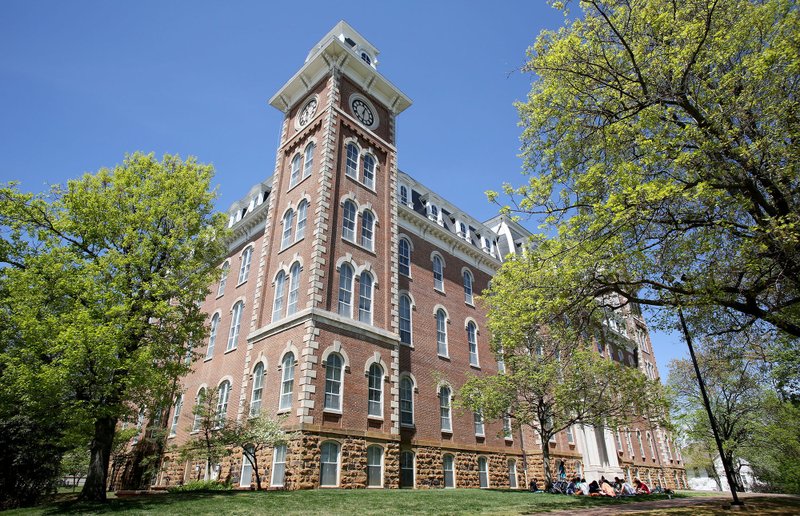Tuition and mandatory fees are proposed to increase this fall by about 2% for in-state students at the University of Arkansas, Fayetteville while remaining flat at a majority of other UA System campuses.
The University of Arkansas System board of trustees will meet for two days beginning Wednesday in Little Rock and via Zoom, with proposed tuition and fee changes a part of the 10-member group's agenda.
If approved, the tuition and mandatory fee costs at UA-Fayetteville would increase to $9,572.40 annually in 2021-22 from $9,384.90 for an in-state student taking a 30-hour schedule over the academic year.
Three large universities are proposing to keep tuition and fees unchanged: the University of Arkansas at Little Rock, the University of Arkansas at Pine Bluff and the University of Arkansas at Fort Smith.
This would mark the second consecutive year without an increase at those universities.
[DOCUMENT: UA System proposal on tuition, fees » arkansasonline.com/525ua/]
In April 2020, the University of Arkansas System board of trustees called on schools to keep tuition flat for fall of last year because of the economic uncertainty related to the pandemic. While the University of Arkansas for Medical Sciences raised its tuition rates for some students last year, other two-year and four-year campuses held the line.
No tuition or institutional fee increases are included in the UAMS proposal for the upcoming academic year.
UA-Fayetteville spokesman Mark Rushing said in an email that the university seeks to keep any tuition and fee increases "as modest as possible."
Rushing added that UA-Fayetteville works to stay "in alignment with the Higher Education Price Index, keeping our tuition competitive and among the lower third of tuition among SEC institutions."
The index is put together by the Commonfund Institute, the investment research arm of asset management firm Commonfund. Earlier this month, the institute announced a forecast inflation increase of 2.2% this fiscal year for U.S. colleges and universities.
UA-Fayetteville typically has students from outside the state making up half of its incoming freshmen. The university is proposing that its out-of-state tuition rate rise about 1.77% to $816.06 per hour. Out-of-state students who meet certain academic thresholds are eligible for a UA-Fayetteville scholarship award program that covers up to 90% of the difference between in-state and out-of-state tuition.
The University of Arkansas at Monticello is proposing to keep tuition unchanged but raise mandatory fees, resulting in a combined increase of 1.52%. For a student taking a 30-hour schedule over the academic year, tuition and mandatory fees would add up to $8,029, up from $7,909.
Among the seven two-year colleges that are a part of the UA System, only two are seeking an increase in either tuition or mandatory fees.
The University of Arkansas Community College at Hope-Texarkana is seeking a total increase of about 4%. For a student taking a 3o-hour course load over the upcoming academic year, mandatory fees and tuition costs would rise to $3,100 for the year.
The University of Arkansas Community College at Rich Mountain proposes to raise its mandatory fees, resulting in a combined increase of 5.47% to $4,050 for the year. The college's main campus is in Mena.
Five two-year colleges are proposing to keep tuition and fees unchanged: Phillips Community College of the University of Arkansas; University of Arkansas Community College at Batesville; Cossatot Community College of the University of Arkansas; University of Arkansas Community College at Morrilton; and University of Arkansas -- Pulaski Technical College.
Sandy Baum, a nonresident senior fellow at The Urban Institute who studies higher education finance, said it was too early to see any tuition trends at colleges and universities for the upcoming academic year.
"Everybody's going to try really hard in the covid era not to do big increases," Baum said. For students and families, she called the economic effects of the pandemic "uneven" as many upper-income families have not been affected financially but others have struggled.
Last week, Arkansas Tech University announced that its board of trustees had approved an increase of about 3% in its undergraduate tuition rate for in-state students, which is now set to rise to $239 per student semester credit hour.
Colleges and universities are receiving millions in federal coronavirus relief aid, but Baum said campuses have also been hit financially by the pandemic. Most two-year colleges and four-year universities in Arkansas have seen overall declines in enrollment since the beginning of the pandemic.
"Institutions lost a lot of revenue and had added expenses, and so they really need this money," Baum said.
